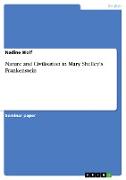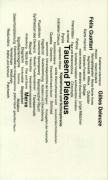Nature and Civilisation in Mary Shelley's Frankenstein
BücherAngebote / Angebote:
Seminar paper from the year 2004 in the subject English Language and Literature Studies - Literature, grade: 1, 0, University of Bayreuth, course: Proseminar, 9 entries in the bibliography, language: English, abstract: Civilization has developed itself from nature, but it has also changed nature in the process. Apart from theories of much cited social analysts like Rousseau or John Locke, one equally well known example is that of man as the hunter: in his natural state, man only hunted to find food, to ensure the survival of himself and his family. In our society, humans do not have to hunt their food by themselves anymore, but we still don't seem to have lost our natural instincts, our natural aggressions. One logical consequence is that we direct our aggressions towards each other, that we decimate our own species, the problem is, however, that natural reasons like ensuring the best breed possible don't exist anymore, that we don't have explanations why we kill each other apparently at random. Tim Marshall writes about a crime known as 'The Edinburgh scandal', which took place in the years of 1828 and 1829. Dr. Robert Knox, an anatomist from Edinburgh and very engaged in the newly upcoming art of dissection, employed two criminals to bring him fresh corpses for his dissections. At this time, grave robbing in order to obtain corpses was an usual occurrence in British graveyards, but in this case the acquired 'objects' didn't come from those who had died naturally, but from people who had been murdered only for the sake of dissection. The reason for these murders was science, and with it civilization, therefore human nature was misused for the sake of science which in turn needed the bodies to explore the secrets nature still withheld from science.
The resemblance to Mary Shelley's novel is apparent. But in Frankenstein, nature and civilization are also set in opposition to each other by the attributes they are giv
Folgt in ca. 10 Arbeitstagen




